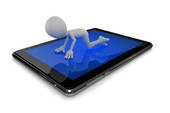Read the following word groups aloud several times. Please don’t try to learn by-heart. Your sub-conscious mind will do that job, even without your knowledge, and rush onto your tongue whenever required. Yes, your job is just to read these word groups aloud several times.
A.
Identifying Things
What’s the name of that furniture?
I beg your pardon.
Can you tell me what is the name of that piece of furniture?
Sorry, I don’t know myself.
Which is your house?
Ours is the last one on the block.
Is yours the red one or the blue one?
The blue one on the right side of the street.
Which one of these are you going to choose?
I like the red one with the blue stripes.
The one over there with black edges is nice too.
But the one we looked at first may be the best choice.
What’s the name of that book John referred to?
It’s slipped my mind for the moment.
Who did he say was the author?
Someone whose name starts with an M.
The car over there by the streetlight is John’s.
Which one do you mean-the old one or the new red one?
Neither. I mean the streetlight on your left.
Oh. Then the one with the convertible top must be his.
B.
Identifying People
Are you Mr. John?
No. that tall fellow is Mr. John.
Do you mean the one over there with glasses?
Yes, the one with white hair.
Who’s that very handsome man?
What did you say?
Do you know who that man over there is?
If you mean the thin, rather dark man, that’s Mr. Noble.
Do you recognize the girl talking to Mr. Noble?
Of course, I know the girl he’s talking to.
Well then, whom is he talking to?
That’s Diane.
What’s that man’s name – the man that’s holding the briefcase?
I know, but I can’t remember it right now.
Where does he come from – Greece or Turkey
One of the two, I think.
Do you know the man over there by the door?
I do, but I can’t remember his name at the moment.
Isn’t he a famous musician?
He’s either a musician or a painter.
C.
Asking about identity
Are you Mr. Venkat?
Are you A Teacher?
Who’s he talking to?
What sort of CD is it?
Do you have some ID with you?
See that Lady? Who’s she?
Which of these books is yours?
Is that you, John?
What type of facial cream do you use?
May I know who you are?
Isn’t that your umbrella?
Do you recognize that lady in a blue jacket>
Who are you?
That’s your brother, isn’t it?
Who’s that lady over there?
Do you know who he is?
Who’re those people?
What in the world is it?
Who on earth told you that?
Do you know that lady standing over there?
See that thing there? What is it?
Isn’t that your mother?
Do you know what is that?
Who are you going to meet?
What on earth is that thing in your bag?
What kind of calculator is it? A scientific one?
D.
Not identifying
I don’t recognize…
I’m afraid I’ve no idea.
I don’t know who it is.
I’ve no idea what it is.
Mmm’… he just reminds me of someone.
But I can’t put a name to his face.
I haven’t the faintest idea.
I have no idea who that is.
No. I don’t think so.
I haven’t a clue.
God knows.
I’m not sure.
















































